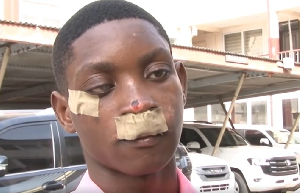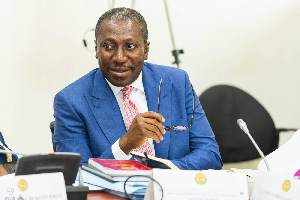I have just read the harrowing story of Dr. Stella Adedevoh who died of the Ebola virus at an isolated unit in Lagos. Her death brings to the fore the recent calls by sections of doctors in Ghana for insurance packages to compensate for the potential risk associated with the resuscitation of Ebola victims. The opponents to this proposition may begin to have a re-think because we may suffer a scarcity of medical personnel when the risk finally catches up with us.
We have had the unpleasantness of dealing with the filth-induced cholera in the recent prompting the Accra Metropolitan Assembly to declare a three-day cleaning exercise with government reportedly committing a vote of GHc6m to help manage this situation which is virtually self-inflicted because of the breakdown of control systems on filth management.
So far, we have been very fortunate not to have recorded any Ebola case as of now. It would however be interesting to test our readiness after all the opportunity we have had to learn from the experiences of others. Cholera on the other hand has reportedly claimed 45 lives from some 5,000 reported cases from July in Accra alone. Our leadership response has been interesting and promising on all account. I am encouraged by the abundance of self-help messages flooding the media space on this seeming national public health concern.
What however amazes me is our willful blindness when the issue is about road traffic crashes and its comparable effect on loss of human resource capital, economy, tourism, national image and poverty reduction efforts among others.
Data on road traffic related fatalities for January-June alone released by the National Road Safety Commission (NRSC) shows that 963 persons have died using the road as passengers, pedestrians, children or motorcyclists with some 6,300 persons suffering severe injuries that might render them physically incapacitated for years or for life.
According to the NRSC, Every year, this struggling economy loses 1.6% of our GDP (GH1,169billion in 2012) to road traffic crashes yet our national consciousness is teased only when the headlines scream out the tolls or when some ‘very important person’ is killed or affected.
This cost (possibly far more than all the International Development Aid received in a year) is estimated from lost output, human cost, medical bills, property damage, administrative cost among others not to mention the increase in widows and orphans and the unbearable grief of families affected by these incidents.
This year alone, some 180 persons have died through road traffic crashes with some 1367 persons injured out of some 2,684 reported cases in Greater Accra alone. This situation has not been enough to tease the consciousness of the Mayor to clear our pedestrian walkways off destruction or prompt us to resource the police with enforcement devices as they continue to count on the generosity of others for basic enforcement devices like radar guns, alcoholmeters in order to be effective.
One of the major contributory factors to road traffic deaths and injuries in Ghana is the poor conditions of service of the guy who drives you or the vehicle behind you. I dare say that the Conditions of Service of the driver like, insurance for our doctors cannot be ignored if we are to remain safe on our roads. 2
In Ghana, drivers are by far the least paid employees even in formal establishments though they are employed to manage very expensive machinery and their highly skilled ‘masters’. In many organizations’, they are overlooked for basic ‘homegrown’ refresher training while their masters globe trot for continuous training to improve their efficiency on the job.
The situation is even worse within the highly unregulated and informal commercial passenger or public transport service dominated by private operators. With the exception of the Metro Mass Transit and Inter-city STC that control less than 15% of that space with some public participation, all other operators are privately owned.
What is disturbing is that, about 23% of all road traffic deaths according to the NRSC are passengers or occupants of commercial passenger buses while 42% are pedestrians who get knocked down using the road, 25% of the pedestrian deaths affecting children of school going age. This among others prompted a study by the NRSC to assess the conditions of service of commercial drivers and how it impacts on road safety.( http://www.ad.nrsc.gov.gh/assets/img/gallery/publications/COMMERCIAL_DRIVER_STUDY.pdf).
The study makes interesting reading and reveals among others that;
1. Over 70% of commercial drivers are responsibly married with children and are breadwinners.
2. Only 60% of commercial drivers meet the minimum requirement of Junior Secondary School education as required by the DVLA.
3. 80% of commercial vehicles are privately owned with each vehicle owner defining different terms of employment and conditions of work to suit him/her.
4. There is no standard code of practice for the industry resulting in the absence of job protection for drivers. Drivers suffer insufficient salary, non-payment of social security, easy lay-off by employers.
5. Commercial drivers get remunerated far below the minimum wage and take to faster speeds in other to make some money in excess of their daily targets at the risk of their lives and that of their passengers.
6. Commercial drivers work in poor conditions without rest or benefit of taking an annual leave and are always stressed from the pressure to meet high demands of the employers.
The overall effect is that, commercial or public service drivers are stressed by their conditions of work to take such risks as driving for long hours and speeding exposing themselves to some physical and emotional health challenges such as fatigue and sleeplessness among others that have been identified as contributory factors to road traffic crashes.
Like the health workers seeking insurance cover to attend to Ebola patients, we must not ignore the need to reflect on the conditions of the driver. Even if you chose to drive yourself, the risk of confronting a “stressful, tired or speedy” driver on the road should not be taken lightly.
Until, the coming into force of Road Traffic Regulations, 2012 L.I. 2180, commercial passenger operations appeared unregulated giving rise to these challenges and more. It appeared saddled with easy entry and exit routes and negative practices.
The sad reality however is that, to every available commercial vehicle, there are four drivers chasing the owner for a job. This situation worsens the conditions of drivers at the expense of public safety.
The opportunity inherent in L.I. 2180 is that, commercial transport operators will have to be registered to provide transport service.
Regulation 121 of L.I. 2180 provides among others that;
1. A person shall not operate a commercial vehicle unless the person holds a road transport operator’s licence.
2. A person shall not operate as a commercial vehicle driver unless that person is employed by or belongs to a recognized commercial road transport organisation
3. The licensing Authority shall issue guidelines for the formation of commercial road transport organizations
4. Each commercial road transport organisation shall be licensed by the Minister or the accredited agent of the Minister if that commercial road transport organisation satisfies the conditions specified in these Regulations.
I understand that preparatory work for the implementation of this regime is currently ongoing. It is my expectation that the DVLA shall with our collective support seize the opportunity of the regulations to develop guidelines for the improvement of the conditions of service of the ‘drivers’ of our lives and our economy.
I am not asking that our drivers should be paid like our high end professionals. This is not a call for equality but one for equity. They are managers of very expensive resources-vehicles and human capital yet disregarded as far as their overall condition of service is concerned.
Our drivers deserve better because they also matter. When your administrative assistant makes a mistake occasioned by fatigue or sleeplessness, the print out ends in the trash bin. Where do we end when the driver makes similar mistakes induced by poor conditions of work? Your guess is as good as mine.
I rest my case.
*Author could be reached on Koduah.atuahene@yahoo.com
Opinions of Monday, 25 August 2014
Columnist: Atuahene, Kwame Koduah
Like Doctors, our Drivers too Matter and Deserve Better
Entertainment













